- Home
- E. M. Foner
Con Living Page 16
Con Living Read online
Page 16
“Perfect. Artificial Intelligence. I’m sure you all know as much about AI as you do about whatever you normally talk about on panels, which is to say—”
“Nothing,” Grynlan interjected in a gravelly drawl.
“—nothing, so here we have our panel discussion on AI, and,” the alien made a show of squinting at the smart badge of the woman he’d chosen for moderator, “Miss Smut is going to introduce the panel.”
“Smith!” she corrected him indignantly.
“Sounds like a fake name for a love-hotel registry to me, but I won’t go there,” the Grenouthian said. “Introduce your panel.”
The woman proved to have an excellent memory and was able to name the table companions she had met over dinner. She gave each a chance to say a few words about themselves, but when the third man began talking about an award he’d received decades ago, the Verlock shouted “Time!”
“Excuse me?” the man said.
“Time,” the bunny picked up on his partner’s criticism. “Your time, my time, our time. You can waste your time talking to the mirror at home, but don’t waste my time or our time in a pathetic attempt to justify your presence on the panel. The civilized galaxy has long since settled on the maximum time for speakers to introduce themselves at cons, and it’s—”
“Twenty-seven seconds,” the Verlock said slowly.
“Twenty-seven seconds,” the Grenouthian repeated. “Next, please, and I’m counting.”
The rest of the introductions went by in a flash, and then the moderator turned to the pair of aliens to see what they wanted her to do next.
“Well, start moderating,” the Grenouthian said.
“Do you want us to have a panel discussion or just go straight to questions from the audience?”
“What does it say in the program?”
“We don’t have a program,” the man who had gone over time on the introduction protested.
“It’s improv,” the Verlock bellowed. “Improvise!”
“I have this,” the moderator said confidently and pretended to be reading from the small screen on her smart badge. “Today we’ll be talking about artificial intelligence in science fiction versus the real thing. What’s scarier? Our imaginations, or the reality of the Stryx?”
“The Stryx don’t exist,” somebody in the audience shouted. “Everybody knows they’re just a bogeyman the aliens made up to keep humanity down.”
“Well?” the Grenouthian asked the moderator. “Aren’t you going to do something?”
“What do you mean?” she asked.
“That man is a heckler. Are you going to let him interrupt your panel at will?”
“I’m sure the other people in the room will tell him to stop interrupting,” she said uncertainly. “What would you have me do?”
“Tomato,” Grynlan declared.
The Grenouthian pulled a bright red tomato out of his belly pouch, wound up, and threw it so hard that the heckler failed to duck out of the way even though he saw it coming. It splattered on impact with the man’s forehead, spraying the people around him with bits of tomato. “The next loud-mouth gets a Dollnick tan tuber in the noggin,” the bunny threatened the audience, and then turned back to the moderator. “Carry on.”
“So, who wants to get us started,” she said nervously. “Eleanor?”
“Well, I was a writer on Lost in the Horsehead Nebula, and in order to make the story believable, we intentionally didn’t include any AI characters because they never would have gotten lost.”
“Wrong,” a younger man on the panel said in an obnoxious voice. “That may be true for most alien artificial intelligence, I couldn’t say, but I’ve met human-made AI that’s no smarter than any of us.”
“If you believe that, Bruce, then I have a space elevator on Jupiter for sale,” Eleanor retorted.
“You always get snarky when you’re wrong,” Bruce shot back.
“If I was trying to be snarky, I would have said something about your suit.”
“Isn’t your nose half the size it was the last time we were on a panel together? Surgery much?”
“Enough!” the Verlock shouted.
“Were you going to let them trade insults all night?” the Grenouthian asked the moderator.
“I watch the audience response during back-and-forths to see how long I should let them go,” she replied. “Everybody seemed to be enjoying it.”
“I don’t remember two idiots insulting each other being in the program description you read.”
“I guess not.” The moderator spotted a raised hand in the audience and pointed in that direction. “Yes?”
“Could everybody speak louder?” the older woman who had raised her hand asked in a surprisingly strong voice. “And when the panelists talk, I notice they’re looking at each other rather than the audience. They should be looking at us.”
The Grenouthian reached in his pouch and handed the moderator a large potato.
“What’s this?” she asked.
“That is a Dollnick tan tuber, and she,” he indicated the old woman in the audience who had just complained, “is a troll.”
“Peg her,” Grynlan ordered.
The moderator jumped at the Verlock’s voice coming from behind her and tried to heave the heavy tuber, which barely made it off the stage.
“Pathetic,” the bunny said. “You throw like a Human.”
“A Human girl,” Grynlan added, and the two aliens shared a belly-bump, apparently well pleased with their joint put-down.
“That’s two strikes,” the Grenouthian told the moderator. “Are you going to get somebody on your panel to say something interesting about AI, or are you giving up?”
“Why are we doing improv anyway?” she asked.
“You can’t spell ‘improve’ without improv, and somebody clearly needs to improve.”
“Hey, are you trying to tell us how to moderate?” the panel’s loud-mouth demanded. “I’ll have you know—”
“Strike three,” the Verlock drowned out the objection, jerking his thumb like an umpire moving in slow motion. “You’re out!”
“Let’s have a round of applause for Table Three,” the Grenouthian said, clapping his furry paws and taking advantage of his mass to hip-check the nearest “volunteer” into motion. “That’s right, they’re finally doing something they’re good at—sitting down. Let’s get Table One up here and see if they can do any better.”
“Or not,” one of the men at Table One said, getting up from his chair and heading towards the exit rather than the stage. The three sliding doors at the back of the banquet hall slid open at the same time, and three aliens, each brandishing a poleaxe, stepped into the room. The doors slid shut behind them, and they simultaneously slammed the butt ends of their weapons into the deck.
“Nobody walks out on Grynlan and the Grenouthian,” the bunny growled. “Get up here with your tablemates, Mr. Moderator.”
The man cast an uncertain gaze at the armed Dollnick who was blocking the closest way out, and then at the Frunge and the Drazen covering the other two exits. His confidence withered, and he followed the others from his table onto the stage.
“We’re going to do something a little different this time,” the bunny announced. “Our group of volunteers will serve as the panel, but Grynlan and myself will be the whole audience.”
“Won’t be the first panel I’ve done for a two-member audience,” the moderator said, and the others from the table all nodded their heads. “I once ran a group discussion about interstellar drives and the only audience member was a ten-year-old Horten boy.”
“And did he explain interstellar drives to you?” the Grenouthian asked facetiously, and then exchanged another celebratory belly-bump with the Verlock.
“It was about interstellar drives in science fiction,” the moderator mumbled. “You don’t have to rub it in.”
“Alright, so let’s do a little improv. What’s the session description in the program guide?”
“Uh, the economics of space elevators in fact and fiction. Why everybody buys them from the Dollnicks.”
“Boring,” Grynlan declared, and began to shuffle off the stage.
“I guess it’s just me now,” the Grenouthian told the moderator. “What are you going to do to keep my butt in the seat?”
“I’m going to stick to the program,” the moderator said indignantly. “If you don’t like it, you can leave with slowpoke.”
“Ten points,” Grynlan announced, turning back and pointing at the man. “You just beat Table Three.”
“You see,” the Grenouthian told the audience. “Running a panel isn’t multiverse physics, you just have to stick to the program guide. Now show us how you take a question for your panel from the audience.”
“Uh, does anybody have a question?” the moderator asked the two aliens.
“I do,” the Grenouthian said. “Why doesn’t the elevator stalk and its giant counterweight make the planet wobble?”
“I know,” a woman on the improv panel spoke up. “Because there’s always another elevator on the opposite side of the world to balance it out.”
“But what if they aren’t on the equator?”
“Who would build a space elevator anywhere else?”
“Uh, Peg?” said her husband, giving her a nudge. “Earth’s elevators aren’t on the equator.”
The Grenouthian bowed to the audience with a flourishing arm movement and said, “I rest my case.” It got a laugh from the sprinkling of aliens in attendance.
Fifteen
“The final step is to add—be careful with that!” Harry interrupted himself to warn the young woman, but she already had the lid off, and her eyes began to stream. “Quick, Bill. Get her to the rinse station.”
Bill vaulted over the counter where he had been helping a middle-aged couple with the Dollnick mixer and half-carried the young woman to the emergency eyewash sink. He pulled her hands away from her eyes, yanked the chain, and ensured that her head was properly positioned for the dual fountains of water.
“Try not to blink,” Bill told her. “Are you okay holding this position yourself?”
“Yes,” she choked out, her hands gripping the edges of the sink. “What was that stuff anyway? I thought the label said it was hot sauce.”
“It is hot sauce, but that’s the special jar we keep for Jorb, a Drazen who eats in our cafeteria,” Bill explained. “I had to stick my whole head in the bar sink once after serving him. By my next shift, Flower had the emergency eyewash station installed.”
“How long do I have to rinse?”
“I’m not sure. Flower?”
“If she got the sauce directly in her eyes, fifteen minutes is the minimum,” the Dollnick AI responded over Bill’s implant. “If it was just a few airborne capsaicin molecules, then she can stop as soon as she’s not in pain.”
“I guess if it doesn’t hurt anymore you can stop, but if your eyes start burning again, I’d keep rinsing them out,” he told the young woman.
The woman reached blindly for the pull chain, tugged it to turn off the water, and straightened up. “Who would have thought that cooking for aliens could be so dangerous?”
“Thank you for that lead-in,” Harry said. He clapped his hands to get the attention of the other participants who had signed up for the workshop. “You all listed professional kitchen experience on the con questionnaire so I’m not going to give you a lecture on safety. The key point here is that just because the aliens can eat most of our foods doesn’t mean that some of their foods aren’t dangerous for us to even handle.”
“I thought aliens could eat everything in the All Species Cookbook because we share some of the same genetic stuff,” a man said.
“I’m not sure if that’s been proven one way or the other, but I do know that the only alien food we can safely eat without elaborate detoxification methodologies is Vergallian vegan.”
“How can you detoxify a food if it’s poisonous on the chemical level?” the young woman with the watering eyes asked as she attempted to dry her hair with a dishtowel.
“Thank you for that question as well,” Harry said with a grin. “People are going to think that you’re a paid shill. Our final recipe for the day is a quick-baking flatbread using flour that comes from the cassava root, which contains cyanide before processing.”
“And that’s poisonous to the aliens as well?”
“Drazens eat raw cassava root while they’re drinking, and I think Jorb mentioned that the Verlocks like it as well,” Bill spoke up. “And that hot sauce was an Earth product exported by Drazen Foods, but you won’t meet too many humans who can tolerate it.”
“So you’re going to teach us how to detoxify cassava roots?” the first man asked.
“I’m afraid that takes too long because there’s a lot of soaking involved,” Harry said. “We grow cassava and manufacture the flour on board, though it’s primarily used for tapioca, one of our many dessert exports.”
“If you can get away early, Razood is asking for help,” Flower told Bill over his implant.
“Are you all set, Harry?” Bill asked. “Apparently Razood is running into trouble with his workshop.”
“Go ahead, the cassava bread is dead easy,” the baker told him. “I’ll see you later when we battle the evil Farling.”
“I forgot that was tonight,” Bill groaned, taking off his apron and tossing it in the laundry bin. He slipped out of the kitchen, through the empty cafeteria, and into the nearest lift tube. “Colonial Jeevesburg,” he requested.
“The workshop is on the con deck,” Flower said. “There was nowhere near enough room in his blacksmith shop for the number of people who registered.”
“Con deck,” Bill corrected his instructions, even though he knew that the Dollnick AI would take him where she wanted. “I thought Razood said he found a couple of new apprentices.”
“He did, but there are over four hundred aspiring weapons smiths signed up for the track, and this workshop on crossbows turned out to be very popular. One of his new assistants caught a finger in a firing mechanism, and the other one is taking the injured man to M793qK for repairs.”
“So Razood wants me to load,” Bill surmised, rubbing his wrist in anticipation of the soreness he’d be feeling later. “Couldn’t the Frunge come up with a high tech solution for cranking back the drawstring? Maybe a battery-powered motor?”
“That would be an anachronism,” Flower told him.
“Are you feeding me vocabulary words for the Open University test again?”
“You’ll remember better if you learn words in context rather than memorizing from a list. Do you know what an anachronism is?”
“Something that doesn’t fit the purpose?” Bill guessed.
“Close. Something that doesn’t fit the time period. A good example would be a recent Earth production about colonial farming techniques that featured draft animals, period costumes, and in the background, the space elevator stalk.”
“How could they have missed that?”
“It happens quite frequently in historical immersives. Since the production crews are living in the present, they can forget that some monument or technology which is always there in the background of their lives postdates the period they are attempting to recreate.”
The lift tube doors slid open on a madhouse of activity, and the Dollnick AI told Bill, “Razood has a partitioned-off space up on the right, just about where the merchant area gives way to the art show.”
Bill began jogging through the crowd, dodging around people wearing alien costumes and aliens wearing human costumes. He was about to ask Flower how far he had to go when a woman ran past him shouting something. It took a moment for his brain to process her warning to run faster or the aliens would get him.
“Uh, Flower?” he said.
“Yes, Bill,” the Dollnick AI replied in his ear.
“A woman just ran past me yelling about being chased by aliens.”
&nbs
p; “She’s an artist doing a performance piece. I tried to talk Lume into chasing her for a lap, but he said that he did his running in the army.”
“Does anybody else know that she’s doing art, or is it just the four of us?”
“Julie knows because she processed the application. And I’ve been contacted by a number of Good Samaritans reporting that there’s a woman with mental health issues fleeing imaginary aliens on the con deck, so the word is getting around,” Flower said. “It’s the next partitioned-off area on your right.”
Bill dropped to a walk so he wouldn’t be out of breath, and against his will, he found himself glancing over his shoulder to see if any aliens were closing in on him. “I guess art is more powerful than I realized,” he muttered.
“Performance art often has an effect on the subconscious even when the audience laughs.”
The workshop was packed, and Bill had to skirt the crowd to get to where Razood was standing on a low platform. The Frunge blacksmith was currently demonstrating a variety of lock mechanisms that allowed crossbows to remain cocked until it was time to fire, one of their main advantages over the longbow.
“This one,” Razood said, nodding at Bill as he slipped in behind the table, “is a Horten design from about six hundred thousand years ago. The Hortens went through a period where they made every part of a crossbow from steel, including the string, which is really a braided wire. Although steel obviously has higher tensile strength than many traditional crossbow materials, you still end up with a weapon that weighs more than some species want to be bothered with, not to mention corrosion issues.”
“How do I craft a crossbow in Legions of the Dark Moons?” somebody dressed as an elf warrior called out.
“Is that a game?” Razood asked.
“It’s THE game,” the elf replied indignantly.
“I only build real weapons and I’ve never played it,” Razood replied. “Isn’t there a help forum?”
“Are you telling me that the siege crossbow on the stand behind you isn’t from a game?” a girl demanded. “It looks like you’d need four arms just to load and cock the thing.”
“Which is why I requested my former apprentice come and lend his help. And I can understand why you would mistake it for a siege weapon, but it’s actually a full-scale replica of a standard Dollnick crossbow from their Princely Wars period.”

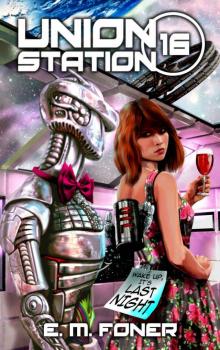 Last Night on Union Station (EarthCent Ambassador Book 16)
Last Night on Union Station (EarthCent Ambassador Book 16)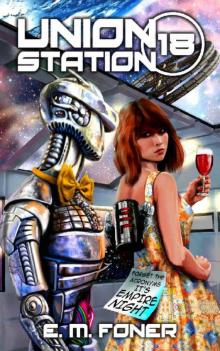 Empire Night on Union Station (EarthCent Ambassador Book 18)
Empire Night on Union Station (EarthCent Ambassador Book 18)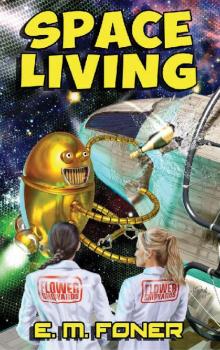 Space Living (EarthCent Universe Book 4)
Space Living (EarthCent Universe Book 4)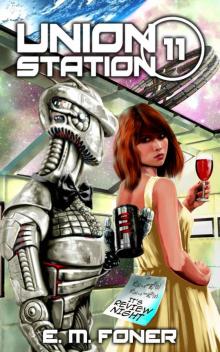 Review Night on Union Station (EarthCent Ambassador Book 11)
Review Night on Union Station (EarthCent Ambassador Book 11)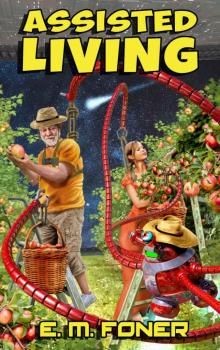 Assisted Living
Assisted Living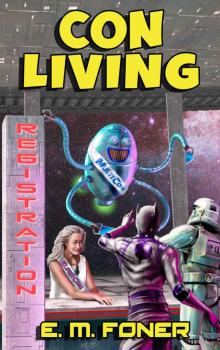 Con Living
Con Living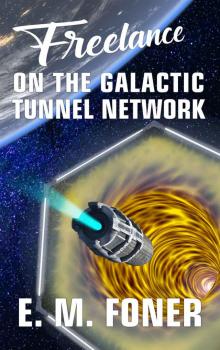 Freelance On The Galactic Tunnel Network
Freelance On The Galactic Tunnel Network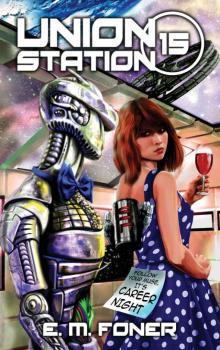 Career Night on Union Station
Career Night on Union Station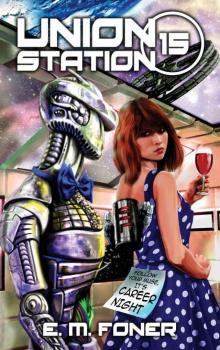 Career Night on Union Station (EarthCent Ambassador Book 15)
Career Night on Union Station (EarthCent Ambassador Book 15)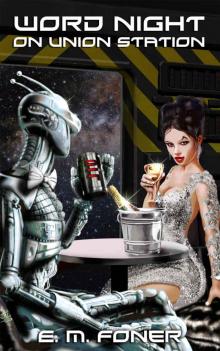 Word Night on Union Station (EarthCent Ambassador Book 9)
Word Night on Union Station (EarthCent Ambassador Book 9)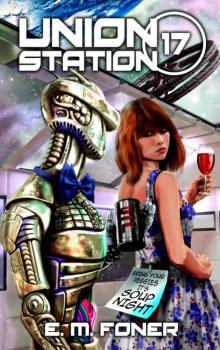 Soup Night on Union Station
Soup Night on Union Station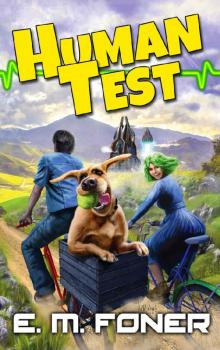 Human Test
Human Test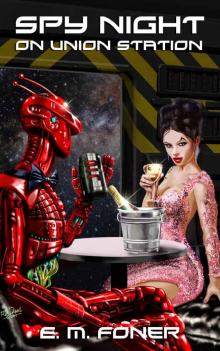 Spy Night on Union Station (EarthCent Ambassador Book 4)
Spy Night on Union Station (EarthCent Ambassador Book 4)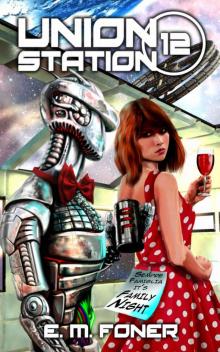 Family Night on Union Station (EarthCent Ambassador Book 12)
Family Night on Union Station (EarthCent Ambassador Book 12) Party Night on Union Station (EarthCent Ambassador Book 10)
Party Night on Union Station (EarthCent Ambassador Book 10)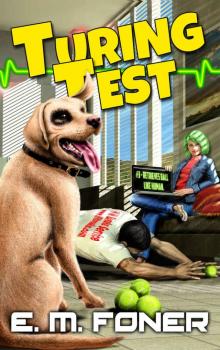 Turing Test
Turing Test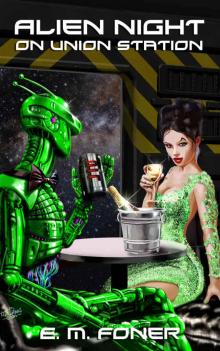 Alien Night on Union Station (EarthCent Ambassador Book 2)
Alien Night on Union Station (EarthCent Ambassador Book 2) Wanderers On Union Station (EarthCent Ambassador Book 6)
Wanderers On Union Station (EarthCent Ambassador Book 6)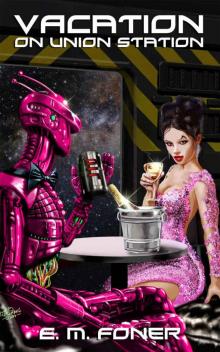 Vacation on Union Station (EarthCent Ambassador Book 7)
Vacation on Union Station (EarthCent Ambassador Book 7)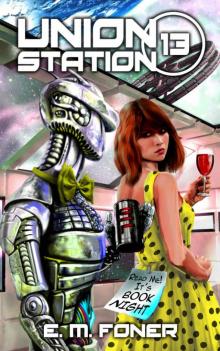 Book Night on Union Station (EarthCent Ambassasor 13)
Book Night on Union Station (EarthCent Ambassasor 13)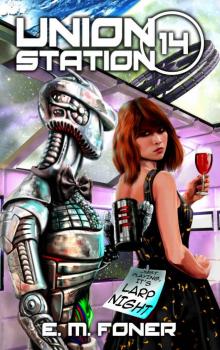 LARP Night on Union Station
LARP Night on Union Station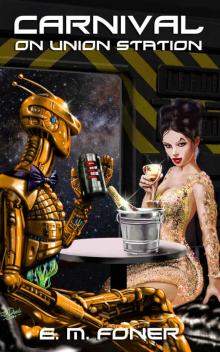 Carnival On Union Station (EarthCent Ambassador Book 5)
Carnival On Union Station (EarthCent Ambassador Book 5)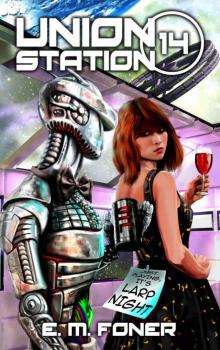 LARP Night on Union Station (EarthCent Ambassador Book 14)
LARP Night on Union Station (EarthCent Ambassador Book 14)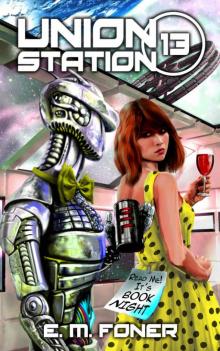 Book Night on Union Station
Book Night on Union Station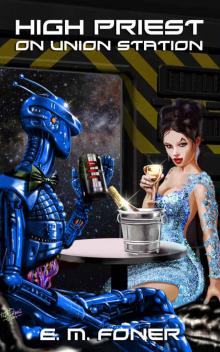 High Priest on Union Station (EarthCent Ambassador Book 3)
High Priest on Union Station (EarthCent Ambassador Book 3)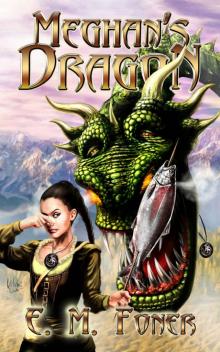 Meghan's Dragon
Meghan's Dragon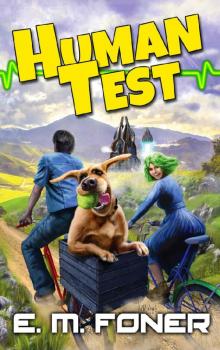 Human Test (AI Diaries Book 2)
Human Test (AI Diaries Book 2)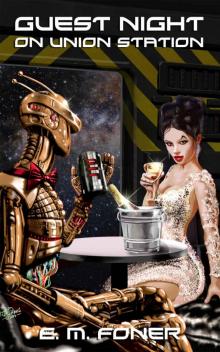 Guest Night on Union Station
Guest Night on Union Station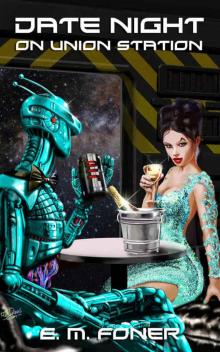 Date Night on Union Station
Date Night on Union Station